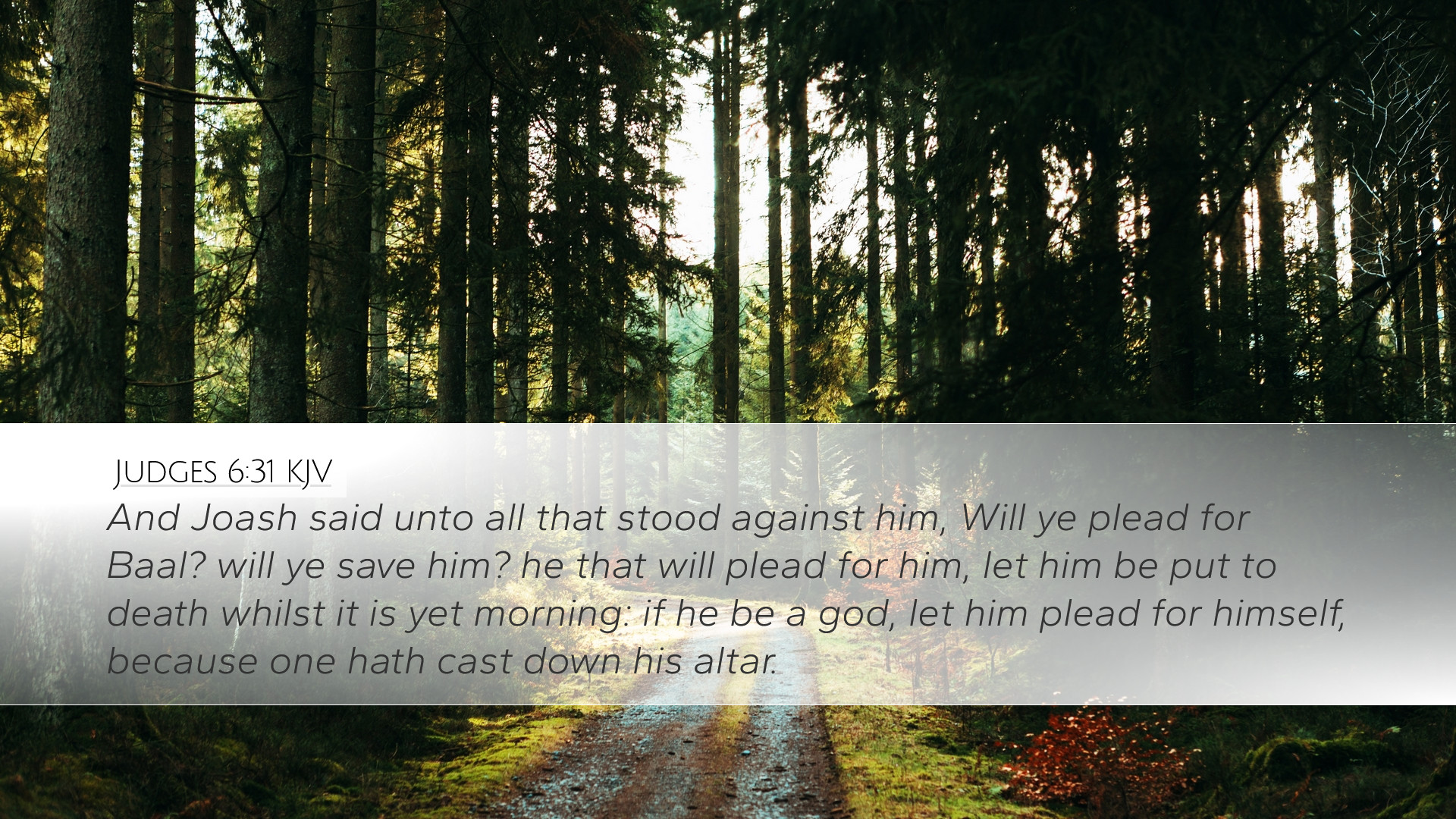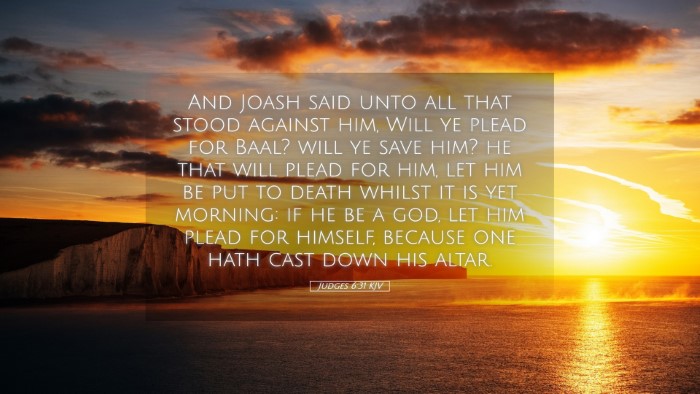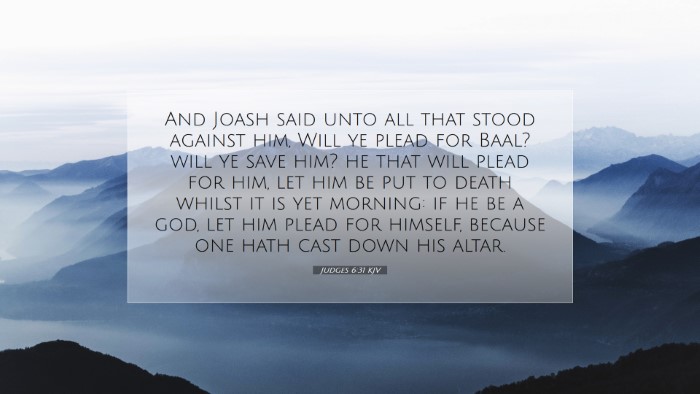Commentary on Judges 6:31
Verse: "And Joash said unto all that stood against him, Will ye plead for Baal? will ye save him? he that will plead for him, let him be put to death whilst it is yet morning: if he be a god, let him plead for himself, because one hath cast down his altar." (Judges 6:31, KJV)
Introduction
Judges 6:31 captures a pivotal moment in the narrative of Gideon, a figure chosen by God to lead Israel against their oppressors. This verse encapsulates Joash's response to the threat against his son Gideon and delineates a stark contrast between divine authority and idolatrous worship. The weight of this moment can be explored through various biblical commentaries, shedding light on its theological implications and historical context.
The Context of the Passage
The book of Judges describes a cyclical pattern of sin and deliverance experienced by the Israelites. Gideon, through divine direction, has just destroyed an altar of Baal, an act that incited the ire of the townspeople. Joash's defense of his son is significant and serves as a microcosm of the broader struggle between fidelity to Yahweh and the allure of pagan practices prevalent among the Israelites at the time.
Exegesis of Key Phrases
- "Will ye plead for Baal?" - This rhetorical question offers insight into Joash’s incredulity at the people's zeal for Baal, questioning the rationality of defending an impotent god.
- "he that will plead for him, let him be put to death whilst it is yet morning" - Joash's use of the law reflects a serious commitment to purging idolatry. This stark ultimatum underscores the gravity of turning away from the true God.
- "if he be a god, let him plead for himself" - Here, Joash offers a profound theological assertion; if Baal truly possesses divinity, he should be able to defend himself. This mirrors the confrontation between Elijah and the prophets of Baal on Mt. Carmel, illustrating a common biblical theme of God’s sovereignty over false deities.
Theological Implications
This verse resonates with the overarching theme of God’s protection over His chosen leaders. Joash’s bravery in opposing the mob is a significant moment of spiritual awakening, reflecting a recognition of Yahweh’s supremacy. Matthew Henry observes that Joash's reasoning symbolizes a breaking away from the tradition of idolatry, urging a return to the worship of the true God.
Moreover, Joash’s defense of Gideon denotes a generational clash where the father must choose loyalty to truth over societal norms. This teaches an invaluable lesson to contemporary believers regarding the necessity of standing firm in faith against cultural pressures.
Insights from Public Domain Commentaries
Matthew Henry's Commentary
Henry highlights Joash’s wisdom in challenging the people by exposing their misplaced loyalty. His defense of Gideon is rooted in both familial love and a deeper understanding of Yahweh’s power. By invoking the notion that if Baal is indeed a god, he ought to defend himself, Henry elaborates on the futility of idolatry, pointing out that true divinity requires no defense by mortals.
Albert Barnes' Notes on the Bible
Barnes notes the boldness of Joash in the face of popular sentiment and emphasizes the loyalty he exhibited to God by encouraging the townsfolk to reconsider their convictions. Barnes emphasizes that Joash’s question reveals the absurdity of Baal worship and challenges the congregation to reflect on the nature of true divinity. This insight underlines the importance of theological clarity in an age rife with confusion.
Adam Clarke's Commentary
Clarke interprets Joash's response as a significant turning point, illustrating that even amidst widespread corruption, there remains the potential for decisive action towards righteousness. He further expounds that Joash's rejection of Baal signifies a reclaiming of familial legacy in the faith of Israel. Clarke also emphasizes that this passage exhibits the human involvement required in the divine mission, urging believers to actively oppose idolatry in their contexts today.
Practical Application
The implications of Judges 6:31 extend beyond historical context, providing present-day believers with a template for faithfulness amidst cultural antagonism. Here are some relevant applications:
- Courage in Faith: Just as Joash defended Gideon, we too are called to stand firm against societal norms that oppose our faith.
- Questioning Idolatry: Believers must regularly evaluate the 'gods' they serve, ensuring their loyalty lies solely with the one true God.
- Intergnerational Influence: The dynamic between Joash and Gideon highlights the importance of faith transmission within families, emphasizing the role of parents in nurturing a biblical understanding in their children.
- God's Sovereignty: In a world rife with uncertainty, the reminder that our God is self-sufficient encourages reliance and trust in His capabilities.
Conclusion
Judges 6:31 stands as a critical intersection in the narrative of Israel's deliverance. The fervent challenge presented by Joash to his peers serves as a reminder of the continuous call to uphold the integrity of worship towards Yahweh alone. In a culture often tempted by various distractions and idols, the lessons encapsulated in this verse encourage sustained faithfulness, courage, and an affirming recognition of God’s supremacy over all. As students of Scripture, pastors, and theologians reflect on this passage, may it inspire a deeper commitment to both personal and collective faithfulness.


